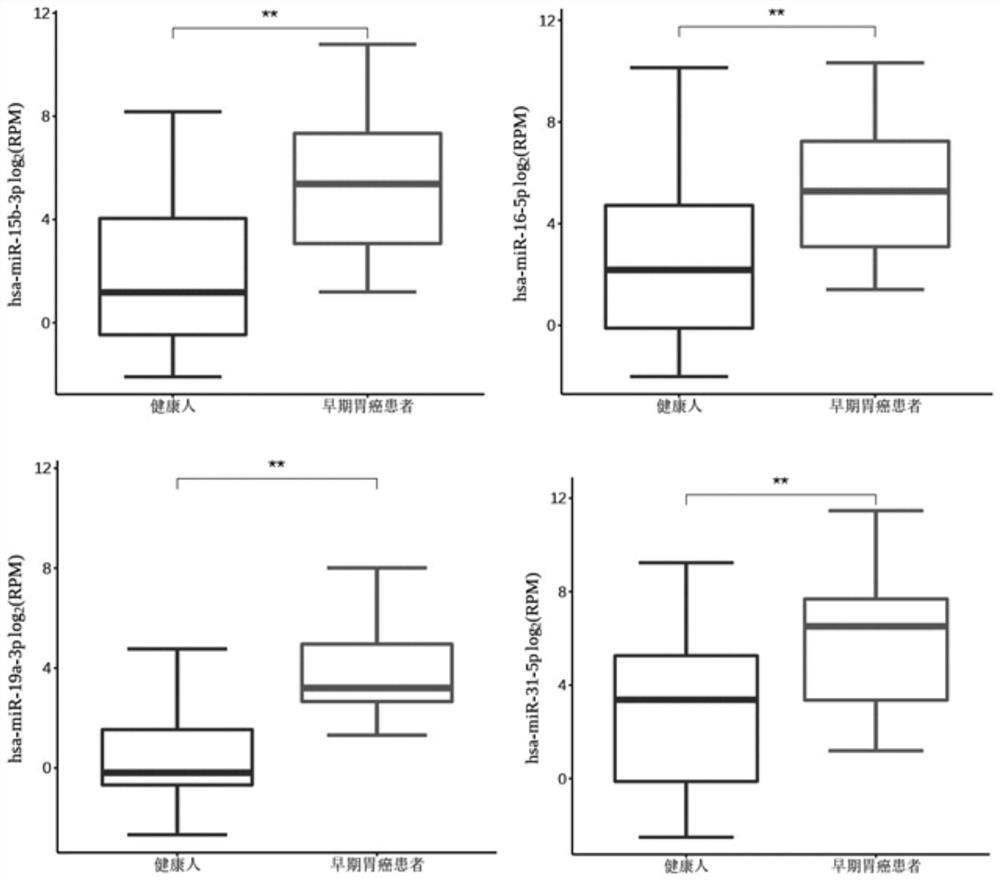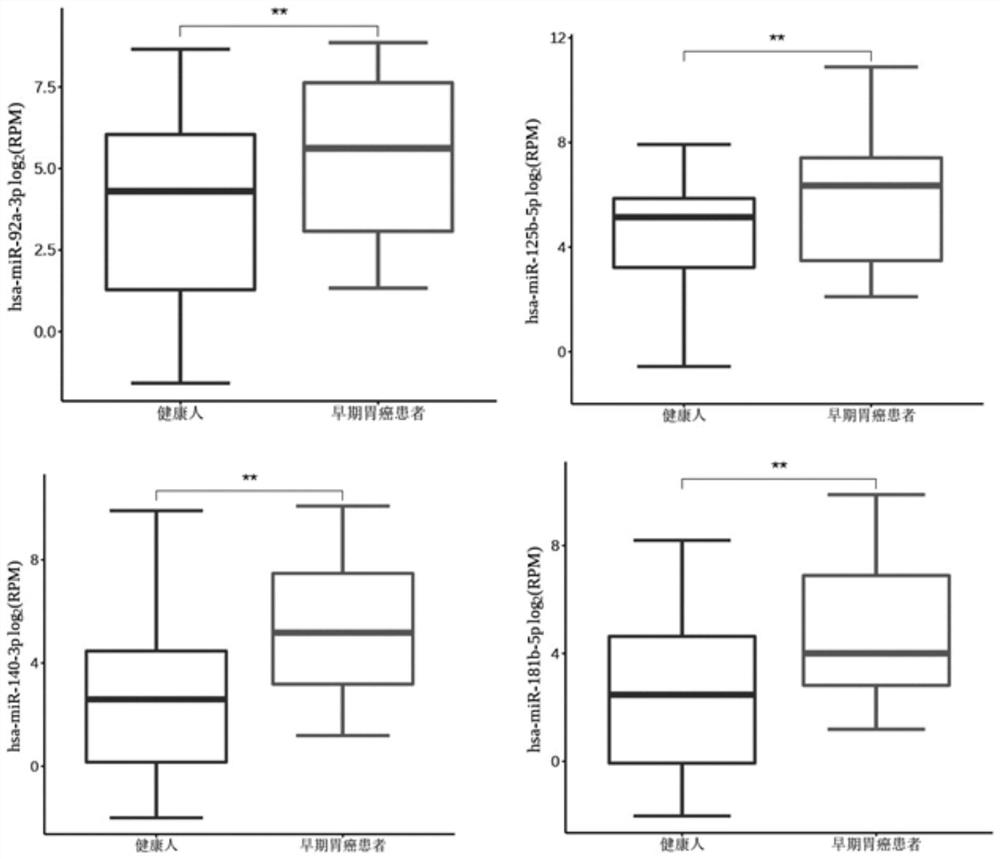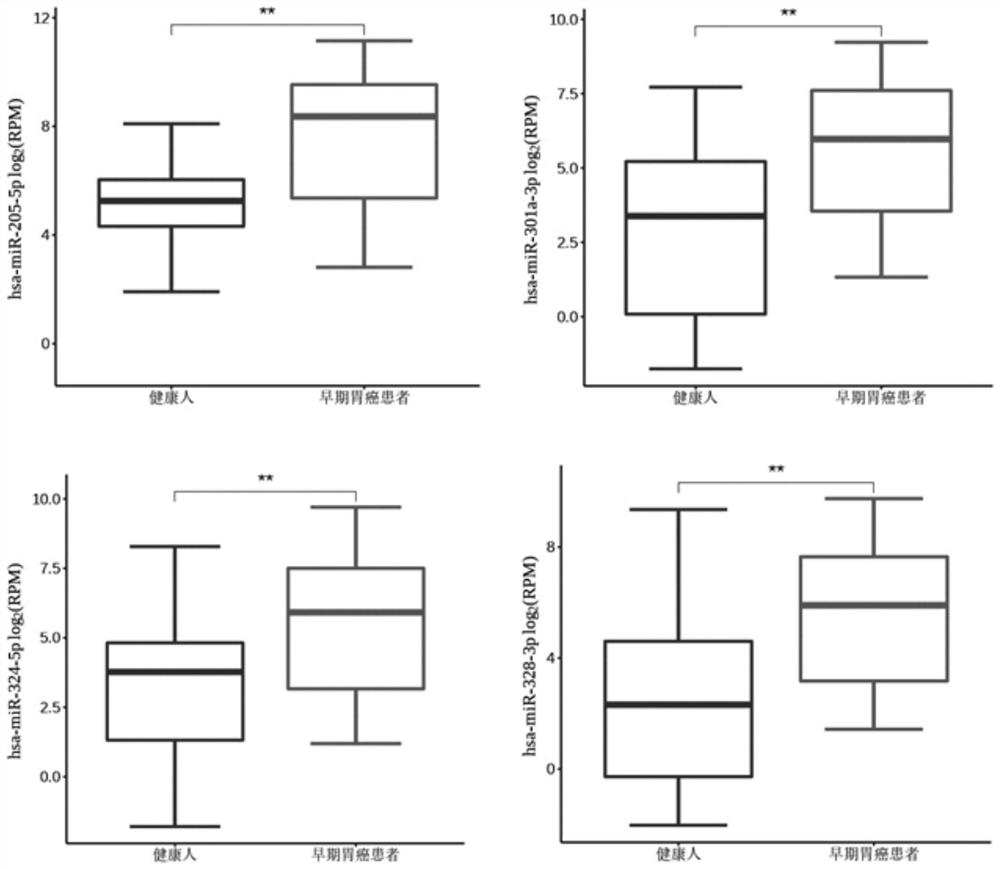A marker, kit and method for early detection of lung cancer
A detection reagent and early detection technology, applied in biochemical equipment and methods, microbiological determination/inspection, DNA/RNA fragments, etc., can solve problems such as poor signal-to-noise ratio, achieve improved accuracy, less trauma, and easy access Effect
- Summary
- Abstract
- Description
- Claims
- Application Information
AI Technical Summary
Problems solved by technology
Method used
Image
Examples
Embodiment 1
[0086] Example 1: Obtain training group samples
[0087] From June 2016 to August 2018, the applicant collected peripheral venous blood samples from 102 untreated patients with early-stage lung cancer. Each sample contained 20ml of peripheral blood, including 61 males and 41 females. The age was 58.3 years, and the age distribution was 34–81 years. During the same period, the applicant collected a total of 100 samples of peripheral venous blood from healthy people (that is, healthy controls without various diseases, the same below), each containing 20ml of peripheral blood, including 60 males and 40 females, with an average age of was 57.9 years old, and the age distribution was 34–80 years old. These two groups of samples are used as training group samples, and there is no statistically significant difference in gender and age of these two groups of samples, so the principle of gender and age matching is met.
[0088] For each peripheral blood sample, sequencing library pre...
Embodiment 2
[0089] Example 2: Sequencing library preparation and next-generation sequencing
[0090] For each training group sample, the following reagents and steps were used for library preparation and next-generation sequencing:
[0091] (1) 20ml of peripheral blood samples were collected in dry blood collection tubes and left at 4°C for more than half an hour, then 400g of free RNA was obtained, centrifuged at 4°C for 10 minutes to take the supernatant, and then centrifuged at 1800g for 10 minutes at 4°C to take the supernatant , to obtain serum samples, stored in -80 ℃ refrigerator;
[0092] (2) Use Qiagen miRNeasy Serum / Plasma Kit (Cat. No.: 217184) to extract 50–200 ng of serum free RNA from the above serum sample, and dilute it to a total volume of 5 μl with ultrapure water (no DNase and RNase, the same below). , and placed in a 200μl thin-walled PCR tube;
[0093] (3) Add 1 μl of adapter RA3 with a concentration of 10 μM to the solution obtained in step (2), mix well, react at ...
Embodiment 3
[0105] Embodiment 3: obtain the expression level RPM of miRNA
[0106] For the off-machine data of the training group samples, the following steps are used for data analysis to obtain the expression level RPM of each miRNA in the samples:
[0107] (1) For the off-machine data of the sample, use FastQC, Cutadpat and Trimmomatic for data quality control and preprocessing (using default parameters) to obtain effective data with low-quality sequences and sequencing adapters removed;
[0108] (2) Remove the random label sequence S2 and the fixed base S3 in RA5 from the 5' end of the sequence of the valid data, and then use the sequence alignment software Bowtie to re-align the obtained sequence to the human reference genome sequence (allowing up to 1 base mismatch), to obtain the location information mapped to the human reference genome;
[0109] (3) Comparing the obtained sequence alignment position information with the corresponding random tag sequence S2, and performing PCR rep...
PUM
| Property | Measurement | Unit |
|---|---|---|
| Sensitivity | aaaaa | aaaaa |
| Sensitivity | aaaaa | aaaaa |
Abstract
Description
Claims
Application Information
 Login to View More
Login to View More - R&D
- Intellectual Property
- Life Sciences
- Materials
- Tech Scout
- Unparalleled Data Quality
- Higher Quality Content
- 60% Fewer Hallucinations
Browse by: Latest US Patents, China's latest patents, Technical Efficacy Thesaurus, Application Domain, Technology Topic, Popular Technical Reports.
© 2025 PatSnap. All rights reserved.Legal|Privacy policy|Modern Slavery Act Transparency Statement|Sitemap|About US| Contact US: help@patsnap.com



